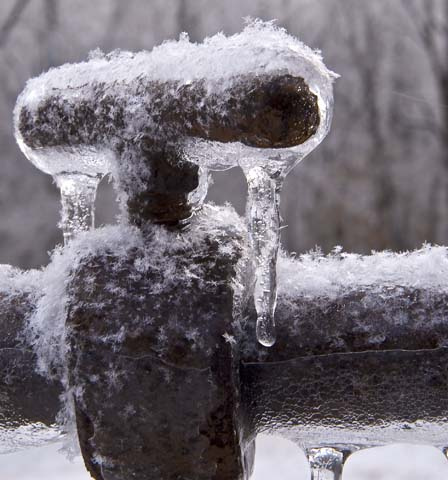Crucial Advice to Avoid Frozen Pipes in Cold Weather
Crucial Advice to Avoid Frozen Pipes in Cold Weather
Blog Article
We have found this post relating to Preventing and dealing with frozen pipes below on the net and felt it made sense to quickly share it with you on this page.

Winter can damage your plumbing, especially by freezing pipelines. Here's just how to avoid it from taking place and what to do if it does.
Introduction
As temperature levels drop, the threat of icy pipelines rises, potentially causing pricey repairs and water damages. Recognizing how to avoid frozen pipelines is critical for house owners in chilly climates.
Understanding Frozen Pipelines
What triggers pipes to freeze?
Pipes freeze when revealed to temperature levels listed below 32 ° F (0 ° C) for prolonged periods. As water inside the pipes freezes, it broadens, putting pressure on the pipeline walls and potentially causing them to break.
Dangers and problems
Frozen pipes can lead to supply of water interruptions, residential property damage, and pricey repair work. Burst pipes can flood homes and create substantial architectural damage.
Signs of Frozen Piping
Recognizing icy pipelines early can stop them from bursting.
Exactly how to determine icy pipes
Try to find decreased water circulation from faucets, uncommon odors or sounds from pipes, and noticeable frost on exposed pipes.
Avoidance Tips
Protecting at risk pipes
Cover pipes in insulation sleeves or utilize heat tape to safeguard them from freezing temperatures. Focus on pipelines in unheated or outside areas of the home.
Home heating methods
Maintain indoor spaces sufficiently heated, specifically areas with plumbing. Open cabinet doors to enable cozy air to distribute around pipes under sinks.
Protecting Exterior Pipes
Garden hose pipes and outside taps
Separate and drain pipes garden tubes before winter months. Set up frost-proof spigots or cover exterior taps with shielded caps.
What to Do If Your Pipelines Freeze
Immediate actions to take
If you suspect icy pipelines, keep faucets open to relieve stress as the ice melts. Make use of a hairdryer or towels soaked in warm water to thaw pipes gradually.
Long-Term Solutions
Structural modifications
Take into consideration rerouting pipes away from outside wall surfaces or unheated locations. Include added insulation to attic rooms, cellars, and crawl spaces.
Updating insulation
Buy high-grade insulation for pipelines, attic rooms, and wall surfaces. Appropriate insulation helps maintain regular temperature levels and minimizes the danger of frozen pipelines.
Final thought
Avoiding frozen pipelines needs proactive measures and fast reactions. By understanding the reasons, indications, and preventive measures, house owners can safeguard their pipes during cold weather.
Helpful Tips to Prevent Frozen Pipes this Winter
UNDERSTANDING THE BASICS: WHY PIPES FREEZE AND WHY IT’S A PROBLEM
Water freezing inside pipes is common during the winter months, but understanding why pipes freeze, and the potential problems it can cause is crucial in preventing such incidents. This section will delve into the basics of why pipes freeze and the associated problems that may arise.
THE SCIENCE BEHIND FROZEN PIPES
When water reaches freezing temperatures, it undergoes a physical transformation and solidifies into ice. This expansion of water as it freezes is the primary reason pipes can burst. As the water inside the pipe freezes, it expands, creating immense pressure on the walls. If the pressure becomes too great, the pipe can crack or rupture, leading to leaks and water damage.
FACTORS THAT CONTRIBUTE TO PIPE FREEZING
Low Temperatures: Extremely cold weather, especially below freezing, increases the risk of pipes freezing. Uninsulated or Poorly Insulated Pipes: Pipes located in unheated areas, such as basements, crawl spaces, or attics, are more prone to freezing. Insufficient insulation or lack of insulation altogether exacerbates the problem. Exterior Wall Exposure: Pipes running along exterior walls are susceptible to freezing as they encounter colder temperatures outside. Lack of Heating or Temperature Regulation: Inadequate heating or inconsistent temperature control in your home can contribute to frozen pipes. PROBLEMS CAUSED BY FROZEN PIPES
- Pipe Bursting: As mentioned earlier, the expansion of water as it freezes can cause pipes to burst, resulting in significant water damage.
- Water Damage: When pipes burst, it can lead to flooding and water damage to your property, including walls, ceilings, flooring, and personal belongings.
- Structural Damage: Prolonged exposure to water from burst pipes can compromise the structural integrity of your home, leading to costly repairs.
- Mold and Mildew Growth: Excess moisture from water damage can create a favorable environment for mold and mildew growth, posing health risks to occupants.
- Disrupted Water Supply: Frozen pipes can also result in a complete or partial loss of water supply until the issue is resolved.
WHY CERTAIN PIPES ARE MORE PRONE TO FREEZING
- Location: Pipes located in unheated or poorly insulated areas, such as basements, crawl spaces, attics, or exterior walls, are at higher risk of freezing.
- Exterior Pipes: Outdoor pipes, such as those used for irrigation or exposed plumbing, are particularly vulnerable to freezing as they are directly exposed to the elements.
- Supply Lines: Pipes that carry water from the main water supply into your home, including the main water line, are critical to protect as freezing in these lines can affect your entire plumbing system.
- Underground Pipes: Pipes buried underground, such as those connected to sprinkler systems or outdoor faucets, can be susceptible to freezing if not properly insulated.
https://busybusy.com/blog/helpful-tips-to-prevent-frozen-pipes-this-winter/

I'm just very serious about Winter Plumbing Precautions: Preventing Frozen Pipes and I hope you enjoyed reading my article. Enjoyed reading our blog? Please share it. Help someone else find it. Thanks for taking the time to read it.
Visit Report this page